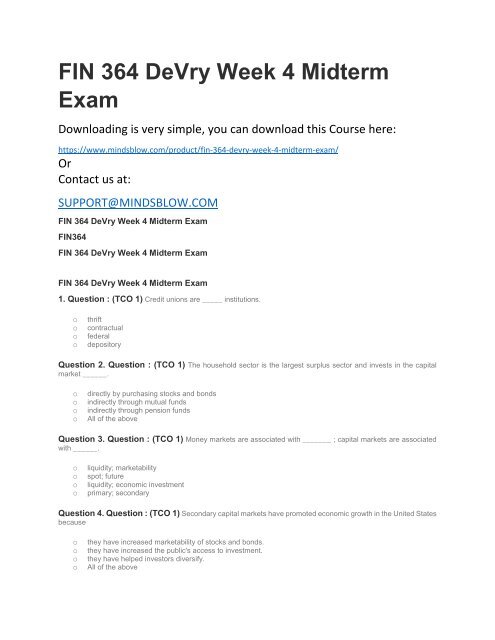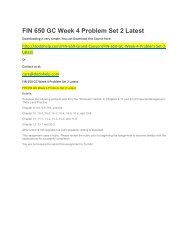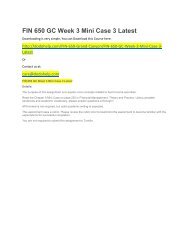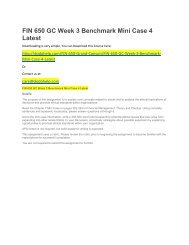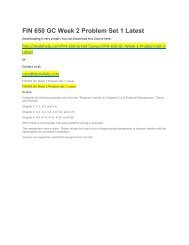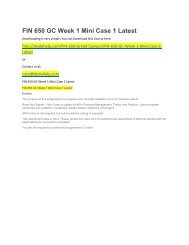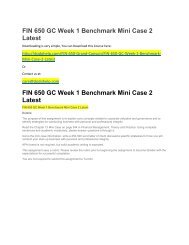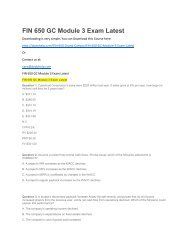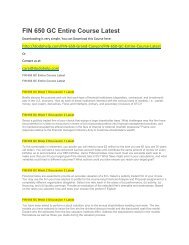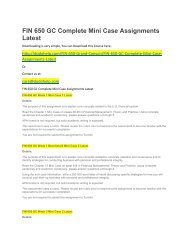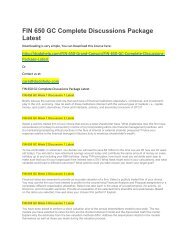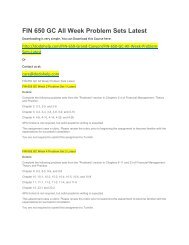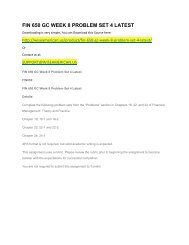Create successful ePaper yourself
Turn your PDF publications into a flip-book with our unique Google optimized e-Paper software.
<strong>FIN</strong> <strong>364</strong> <strong>DeVry</strong> <strong>Week</strong> 4 <strong>Midterm</strong><br />
<strong>Exam</strong><br />
Downloading is very simple, you can download this Course here:<br />
https://www.mindsblow.com/product/fin-<strong>364</strong>-devry-week-4-midterm-exam/<br />
Or<br />
Contact us at:<br />
SUPPORT@MINDSBLOW.COM<br />
<strong>FIN</strong> <strong>364</strong> <strong>DeVry</strong> <strong>Week</strong> 4 <strong>Midterm</strong> <strong>Exam</strong><br />
<strong>FIN</strong><strong>364</strong><br />
<strong>FIN</strong> <strong>364</strong> <strong>DeVry</strong> <strong>Week</strong> 4 <strong>Midterm</strong> <strong>Exam</strong><br />
<strong>FIN</strong> <strong>364</strong> <strong>DeVry</strong> <strong>Week</strong> 4 <strong>Midterm</strong> <strong>Exam</strong><br />
1. Question : (TCO 1) Credit unions are _____ institutions.<br />
o<br />
o<br />
o<br />
o<br />
thrift<br />
contractual<br />
federal<br />
depository<br />
Question 2. Question : (TCO 1) The household sector is the largest surplus sector and invests in the capital<br />
market ______.<br />
o<br />
o<br />
o<br />
o<br />
directly by purchasing stocks and bonds<br />
indirectly through mutual funds<br />
indirectly through pension funds<br />
All of the above<br />
Question 3. Question : (TCO 1) Money markets are associated with _______ ; capital markets are associated<br />
with ______.<br />
o<br />
o<br />
o<br />
o<br />
liquidity; marketability<br />
spot; future<br />
liquidity; economic investment<br />
primary; secondary<br />
Question 4. Question : (TCO 1) Secondary capital markets have promoted economic growth in the United States<br />
because<br />
o<br />
o<br />
o<br />
o<br />
they have increased marketability of stocks and bonds.<br />
they have increased the public's access to investment.<br />
they have helped investors diversify.<br />
All of the above
Question 5. Question : (TCO 1) Which of the following is not a debt security?<br />
o<br />
o<br />
o<br />
o<br />
Corporate bonds<br />
U.S. Government securities<br />
Federal agency securities<br />
Common stock<br />
Question 6. Question : (TCO 1) A conditional contract granting its holder the right to buy assets in the future is<br />
a ______.<br />
o<br />
o<br />
o<br />
o<br />
put<br />
forward contract<br />
futures contract<br />
call<br />
Question 7. Question : (TCO 1) The ease with which a financial claim can be resold is its ______.<br />
o<br />
o<br />
o<br />
o<br />
quality<br />
risk<br />
marketability<br />
perpetuity<br />
Question 8. Question : (TCO 2) Who has a permanent vote on the FOMC?<br />
o<br />
o<br />
o<br />
o<br />
President of the Federal Reserve Bank of New York<br />
Federal Advisory Council<br />
President of the Federal Reserve Bank of San Francisco<br />
Congress<br />
Question 9. Question : (TCO 2) An increase in Federal Reserve float<br />
o<br />
o<br />
o<br />
o<br />
decreases bank reserve deposits in the Fed.<br />
increases bank reserve deposits in the Fed.<br />
has no impact upon bank reserves deposits in the Fed.<br />
reduces the net loan granted by the Fed to member banks.<br />
Question 10. Question : (TCO 2) If the Fed wanted to increase the money supply immediately but just slightly,<br />
it would most likely ______.<br />
o<br />
o<br />
o<br />
o<br />
buy securities on the open market<br />
lower the Discount Rate<br />
lower reserve requirements<br />
Any of the above would be suitable for this purpose.<br />
Question 11. Question : (TCO 3) Unemployment should fall if ______.<br />
o<br />
o<br />
o<br />
o<br />
wages increase and people expect prices to rise as well<br />
wages increase and people expect prices to be stable<br />
interest rates rise more than prices are expected to rise<br />
the money supply increases<br />
Question 12. Question : (TCO 3) Monetary policies directed toward increased economic growth may have what<br />
impact upon the value of the dollar in relation to other currencies?<br />
o<br />
Increase
o<br />
o<br />
o<br />
Decrease<br />
No effect<br />
None of the above<br />
Question 13. Question : (TCO 3) The "tools" of monetary policy, whether "viable" or not, include all the following<br />
except______.<br />
o<br />
o<br />
o<br />
o<br />
changing the discount rate<br />
open market operations<br />
changes in reserve requirements<br />
changes in the Federal Funds rate<br />
Question 14. Question : (TCO 3) Monetarists and Keynesians agree that______.<br />
o<br />
o<br />
o<br />
o<br />
monetary policy influences the real sector<br />
changes in the money supply drive changes in interest rates<br />
changes in interest rates drive changes in the money supply<br />
monetary policy does not influence the real sector<br />
Question 15. Question : (TCO 2, 3) Which of the following was not a responsibility of the early Federal Reserve?<br />
o<br />
o<br />
o<br />
o<br />
Replace the National Banking system<br />
Improve the payments system<br />
Establish more rigorous bank supervision<br />
Act as "lender of last resort"<br />
Question 16. Question : (TCO 4) Which of the following statements about interest rates is incorrect?<br />
o<br />
o<br />
o<br />
o<br />
Bond prices and interest rates change inversely with one another.<br />
The expected rate of inflation affects current market interest rates.<br />
Short-term interest rates are not as volatile as long-term interest rates.<br />
Interest rates are directly related to the level of output in the economy.<br />
Question 17. Question : (TCO 4) Interest rates should increase if<br />
o<br />
o<br />
o<br />
o<br />
the economy is in a boom.<br />
inflationary expectations have decreased.<br />
the Federal Reserve has decreased M1 and the supply of loanable funds.<br />
inflationary expectations have increased.<br />
Question 18. Question : (TCO 4) Interest rates move ______ with expected inflation and _____ with economic<br />
activity.<br />
o<br />
o<br />
o<br />
o<br />
directly; inversely<br />
inversely; inversely<br />
directly; directly<br />
inversely; directly<br />
Question 19. Question : (TCO 4) If nominal interest rates are 10% and expected inflation is 5%, ______.<br />
o actual inflation exceeds 10%<br />
o the real rate of interest is 5%<br />
o market rates are expected to increase to 15%<br />
o expected interest rates are 5%
Question 20. Question : (TCO 4) With the real rate at 5%, most loans were made at 10% last year. This year,<br />
interest rates have declined to 8%. What was the expected inflation rate last year?<br />
o 5%<br />
o 2%<br />
o 10%<br />
o 8%<br />
1. Question : (TCO 1) List and briefly describe the main risks managed by financial intermediaries.<br />
Question 2. Question : (TCO 2) Explain why the Federal Reserve is less "independent" than it appears to be.<br />
Question 3. Question : (TCO 3) What should happen to consumption if the monetary base increases? Explain.<br />
Question 4. Question : (TCO 4) Explain why realized real rates of interest are sometimes negative but expected<br />
real rates are always positive. Give an example.


